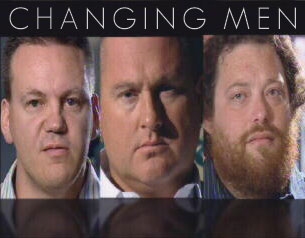Changing Men
Can violent men unlearn their behaviour? Across Australia hundreds of men are joining new voluntary programs, which claim to help change their ways.
 Every five days, on average, a woman is killed by her partner. Jailing the man is the only response to the most vicious cases. But is there another way to tackle domestic violence? Can violent men unlearn their behaviour? Across Australia hundreds of men are joining new voluntary programs, which claim to help change their ways. Over a six month period we follow three men, each at a different level on the scale of abuse, as they enter these programs. Can they remake themselves and save their relationships?
Every five days, on average, a woman is killed by her partner. Jailing the man is the only response to the most vicious cases. But is there another way to tackle domestic violence? Can violent men unlearn their behaviour? Across Australia hundreds of men are joining new voluntary programs, which claim to help change their ways. Over a six month period we follow three men, each at a different level on the scale of abuse, as they enter these programs. Can they remake themselves and save their relationships?
Andrew had never hit his wife but they both knew it was a just a matter of time. Roxanne lived in fear of "getting hurt emotionally, physically...of the kids being hurt emotionally beyond repair". The relationship started well but after moving in together, Andrew started controlling Roxanne financially and emotionally. "It's a power thing being in control of your partner, knowing everything they've done, making them account for why they did it". When Roxanne became a mother, Andrew's anger only grew worse. Depressed and lonely, Roxanne continually thought of leaving, but never did. "I thought, 'No, but he can get better. He wants to get better. He doesn't want to treat me like this.'"
Despite Roxanne's fears, Andrew didn't believe he had a problem, he'd never hit his wife and adored his children. Then one day at work he was issued with a warning for aggressive behaviour. That was a turning point. "I'm glad that happened because it was the catalyst for me to take action to really save my marriage". Since Andrew joined a support group, Roxanne has seen their home life improve dramatically. However, they both remain realistic and Andrew admits, "there's still work to do".
Adam's life has been dominated by violence: "I've had arguments and punch-ups on the cricket field, in the street, at work, especially in the pubs. I just snap and I lose control". Krissy, his partner of nine years, felt the brunt of his aggression. Bit by bit, she was alienated from friends and family because of Adam's behaviour. Things escalated until a pack of crisps left on the sofa almost cost Krissy her life. "I'm very ashamed of what I have done. You know I've choked her, she nearly passed out". This crisis prompted Adam to join the group. Although the pair saw an initial improvement, Adam relapsed and is now estranged from his family.
Alex, a physically and intellectually daunting former blacksmith, also found his relationship deteriorated soon after they moved in together. Alex's descent into violence was gradual: "You sort of go to hell in fractions of an inch", he explains. On some occasions, he is unable to recall what caused it - such as what made him punch his wife's face just before her father's funeral. For Margaret, Alex's behaviour is a survival mechanism: "his survival and well being are dependent on his actually controlling his environment and manipulating people around him".
It was Margaret's concern for their son that made her leave. "I was not going to survive as any kind of parent in the relationship, I was losing faith in my ability to take care of Miles". When they left, Alex knew he had to change. After a few months attending a voluntary program, Alex has regained part of Margaret's trust. They now spend three days a week together as a family.
Not all controlling or violent men can change, but for those willing to try, there's hope. Relationships may not always recover, but perhaps life can become safer for the families.
Reporter: Janine Cohen
FULL SYNOPSIS
